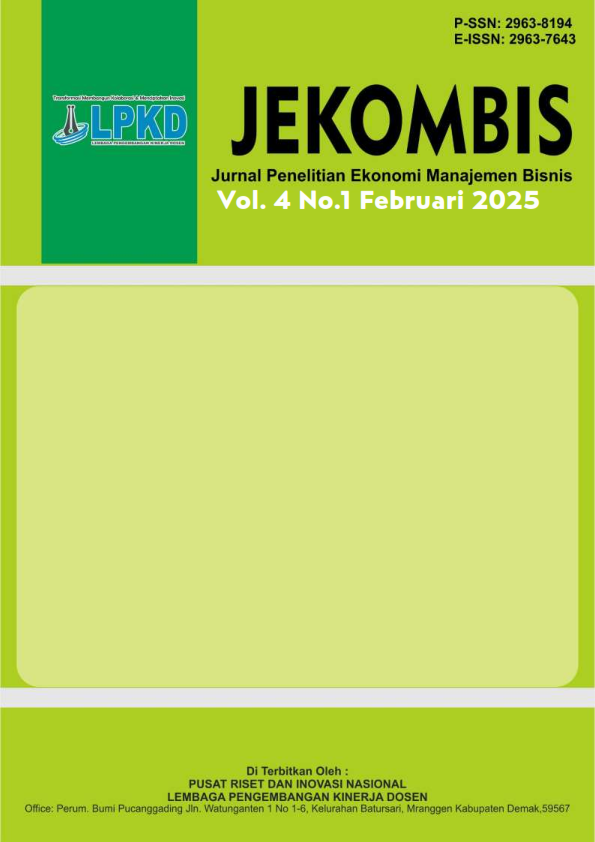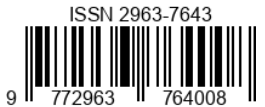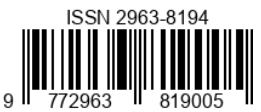Etika Bisnis Islam
DOI:
https://doi.org/10.55606/jekombis.v4i1.4695Keywords:
Business, Ethics, IslamicAbstract
Islamic business ethics are moral values and rules that govern business activities within the framework of Islamic teachings. This study aims to achieve justice, integrity and honesty as well as balance and prosperity for all parties involved. The problem that occurs is that companies in Indonesia have not yet fully implemented business ethics in running the company. The research method used is library research, by collecting and analyzing data from various sources such as journals, books, and related articles. The results of the analysis show that Islamic business ethics refers to the main sources of Islamic teachings, namely the Qur'an and Hadith, which provide guidelines on how humans should interact fairly and ethically in economic transactions. In the perspective of Islamic law, there are basic principles that must be avoided in doing business, namely: not containing elements of usury, not containing elements of fraud and not doing business with prohibited goods. In conclusion, understanding and applying the principles of basic values of honesty, justice, and mutual benefit and benefits for their business. This not only provides benefits for the company in the long term, but also has a positive impact on society and the surrounding environment. Thus, Islamic business ethics become a strong foundation in managing business sustainably and building a just and prosperous society.
Downloads
References
Bisri, A. M. (2022). Etika bisnis dalam Islam. IQTISHOD: Jurnal Pemikiran Dan Hukum Ekonomi Syariah, 1(2), 126–133. https://doi.org/10.69768/ji.v1i2.11
Handayani, L. (2018). if Islam yaitu, Tauhid (Keesaan Tuhan), ‘Adl, (Keadilan), Nubuwwah (Kenabian), Khilafah (Pemerintah), dan Ma’ad (Hasil). Sedangkan. 2(1), 14–25.
Hukum, J., & Syariah, E. (2023). J-HES. 7.
JASMINE, K. (2014). 済無No Title No Title No Title. Penambahan Natrium Benzoat Dan Kalium Sorbat (Antiinversi) Dan Kecepatan Pengadukan Sebagai Upaya Penghambatan Reaksi Inversi Pada Nira Tebu, 1, 8–22.
Maulida, N., Novita, & Aisyah, S. F. (2024). Etika bisnis Islam: Implementasi prinsip keadilan dan tanggung jawab dalam ekonomi syariah. El-Iqthisadi Jurnal Hukum Ekonomi Syariah Fakultas Hukum Dan Syariah, 6, 49–61. https://doi.org/10.24252/el-iqthisady.vi.46740
Nurmadiansyah, M. T. (2017). Etika bisnis Islam: Konsep dan praktek. Cakrawala Pustaka, 1-97.
PT Reliance Life. (n.d.). Etika bisnis perusahaan. Diakses 27 Desember 2024, dari https://reliance-life.co.id/about/etika-bisnis-perusahaan
Rachmayani, A. N. (2015). No 主観的健康感を中心とした在宅高齢者における健康関連指標に関する共分散構造分析Title.
Simorangkir, J. (2003). ETIKA: Bisnis, Jabatan dan Perbankan, 82.
Syahrizal, A. (2018). Etika bisnis dalam perspektif Islam. Jurnal Aktualita, 9(1), 101–116. https://books.google.co.id/books?id=ZPl7EAAAQBAJ&lpg=PA10&dq=etika%20bisnis&lr&hl=id&pg=PP1#v=onepage&q&f=false
Tafsirweb. (n.d.). Surat al-Baqarah, ayat 275. https://tafsirweb.com/1041-surat-al-baqarah-ayat-275.html
Tafsirweb. (n.d.). Surat an-Nisa, ayat 29. https://tafsirweb.com/1561-surat-an-nisa-ayat-29.html
Downloads
Published
How to Cite
Issue
Section
License
Copyright (c) 2025 Jurnal Penelitian Ekonomi Manajemen dan Bisnis

This work is licensed under a Creative Commons Attribution-ShareAlike 4.0 International License.







